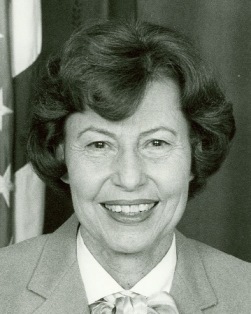
Former U.S. Rep. Jan Meyers, R-3rd Dist., died on June 21, 2019.
Meyers served in Congress from 1985 to 1997. Prior to that, she was in the Kansas Senate from 1972 to 1984.
Kansas Gov. Laura Kelly ordered flags to be flown at half-staff on Monday, June 24, at the Kansas State Capitol in honor of former Congresswoman Meyers, who was the first Republican woman elected to the U.S. House from Kansas.
Rep. Meyers, 90, was born in Lincoln, Nebraska, and graduated from the University of Nebraska-Lincoln in 1951. She also attended William Woods College in Fulton, Missouri.
Working from 1951 until 1954 as an advertising and public relations assistant at a radio station in Omaha and a department store in Lincoln, Nebraska, Meyers later moved to the Kansas City area, where she served as a city councilwoman from 1967 to 1972 in Overland Park, Kansas. She was a state senator from 1972 until 1984.
In 1984 she was elected to Congress, and from 1995 to 1997 she was the chairwoman of the U.S. House Committee on Small Business.
“I was deeply saddened to hear of the passing of Congresswoman Jan Meyers, whom I respected and admired,” Gov. Kelly stated. “As the first Republican woman elected to the U.S. House from Kansas, she was a groundbreaking public servant in many ways, and a role model for all.
“Her dedication to Kansas as a member of Congress will be forever remembered,” the governor stated. “Lt. Governor Lynn Rogers and I, along with our families, extend our heartfelt condolences to Congresswoman Meyers’ family.”
U.S. Sen. Pat Roberts, R-Kansas, released the following statement after the death of former Congresswoman Jan Meyers:
“Congresswoman Meyers was a trusted colleague, but most importantly a friend. I always looked up to Jan and depended on her advice and counsel during my time serving alongside her in Congress,” Sen. Roberts stated. “As the first Republican woman elected to the U.S. House of Representatives from Kansas, she set a great example for future generations. She was kind, caring, honest and extremely well respected in not only the 3rd District, but the entire state. Franki and I are praying for the entire Meyers family during this difficult time.”
